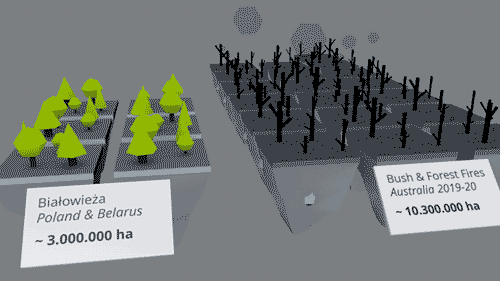Australian forest fires wreak havoc
January 23, 2020
As 2019 drew to a close, there were 12 houses on Jack Egan's street in North Rosedale in New South Wales. Today, only four remain.
Egan, who has Rural Fire Service training, stayed to defend his home even after his neighbors heeded official warnings and evacuated.
Egan told DW fire-ravaged streets like his look the same across the country: "There's the rubble of the houses, the corrugated iron from the roof collapsed on top of it, all the timber's been incinerated, the bush around is completely denuded and black."
Nature and culture up in flames
One of the country's previous worst-ever natural disasters, the Black Saturday bushfires in 2009, killed almost 200 people and burned through 450,000 hectares (1.1 million acres) following a severe heatwave.
This season has already seen 10 million hectares (25 million acres) ablaze. While it hasn't taken as many human lives as the fires a decade ago (the current death toll is 27), ecologists estimate more than 1 billion animals have died.
Several species may now face extinction, and large swathes of rainforest and coastal ecosystems normally considered too wet to burn will take decades to regenerate — even if they are spared future fires.
That's not to mention the enormous loss experienced by First Nations people, who have witnessed the destruction of ancient, sacred trees and sacred sites, and face the possible extinction of ancestral and totemic plants and animals that are deeply entwined with their cultural identity.
The following Augmented Reality infographic (iOS only, Android coming soon) offers a visual comparison of the size of the burnt area in Australia with the total size of some of the world's most iconic forests.
-
Find a well-lit open space
-
Point your device towards the ground and tap the cube icon on the top right corner of the preview model
-
Follow on-screen instructions: Slowly move the phone, let your device scan the ground and place the AR content
-
You're now looking at a room-scale 3D graphic: Move around, tilt your phone, explore different perspectives
Crippling drought and lethal heat
The current bushfires follow unprecedented heat and drought. Australia had below average rainfall every month last year, and New South Wales — the hardest hit state on Australia's east coast — is in its 38th consecutive month of above average temperatures.
Standing in the wreckage of the home he and his partner Cath Bowdler only recently finished renovating, Egan hopes the rest of the world is watching.
"Look what has happened to us," he says. "We're the early victims here, but this will happen to you. We don't want it to happen to you, but the only way we can prevent it is for us to cooperate on effective climate action policies."
